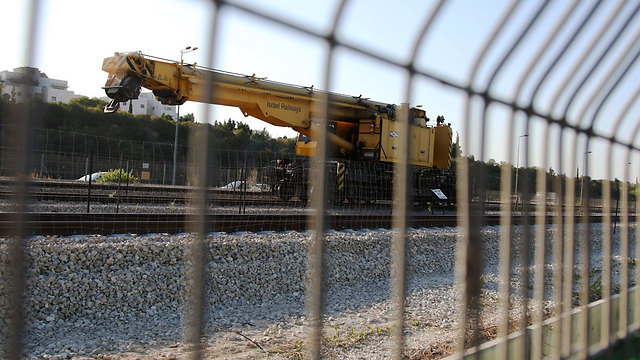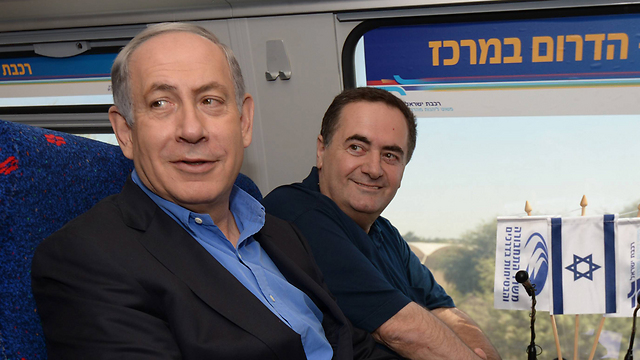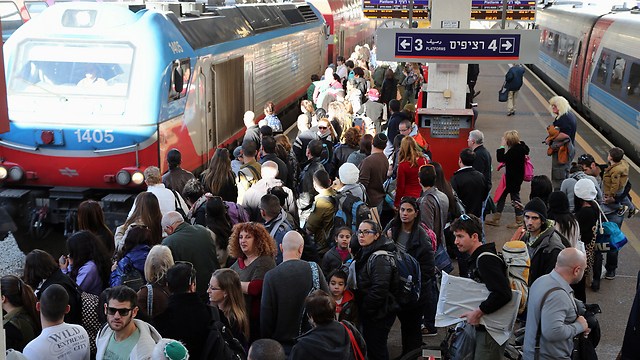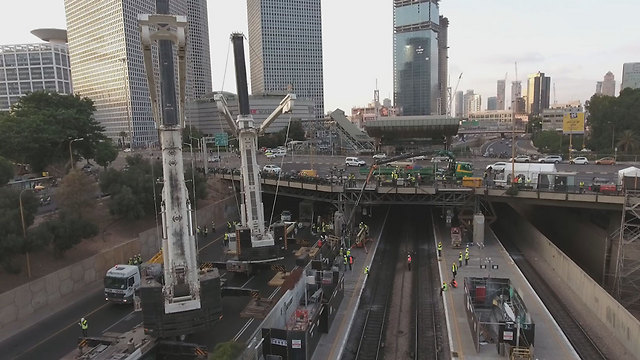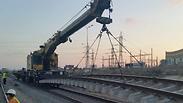

High Court rule that prime minister cannot bar train work on Shabbat
In yet another development in the Shabbat train construction ruckus, the High Court of Justice rules that Netanyahu does not have the authority to halt infrastructure work. MK Zehava Galon, who filed the petition, said, 'If it wasn't for the petition, the Israeli public might have been left with the impression that the prime minister, as an individual, could order any institution in the country to halt plans essential for the public.'
In response to a petition submitted by MK Zehava Galon (Meretz), the court ordered the train company "not to heed any provision regarding infrastructure and maintenance work given to it by the prime minister, until a final decision is made on the petition."

On Friday evening, Netanyahu, capitulating to pressure by the ultra-Orthodox parties, ordered a halt to planned infrastructure work just five minutes before Shabbat. Because some of the train tracks have already been disassembled, trains scheduled for Saturday night and Sunday had to be cancelled, creating chaos both in public transportation and on the roads, where citizens were stuck in heavy traffic.
At court, however, it appeared that the situation could have been avoided. In the state's response to the petition, it noted that despite ordering a halt to the planned upgrades, the prime minister did not cancel the permits given to Israel Railways to carry out the infrastructure work on Shabbat and furthermore, he was legally unable to. Therefore, the planned upgrades could have gone on as planned.
The state went on to say in its response that only the labor minister, a position currently held by Likud Minister Haim Katz, has the authority to cancel the work permits.
"The permits were not cancelled and remain valid," the state said in its response. "Therefore, Israel Railways may make use of the permits as long as they have not been cancelled."
The response further noted that the relevant government bodies were examining the issue for application in future instances.
The state also urged the court to reject the petition, saying it "concerns the carrying out of upgrades planned for last weekend ... making it no longer relevant and purely theoretical."
Meretz chairwoman Zehava Galon, who filed the petition, said in response: "It is shameless that the state is trying to hide behind flimsy procedural answers, as if the matter has become theoretical.
"The state's failure to address the main question of whether the prime minister has the authority to order the halt of infrastructure work is akin to their acceptance of my position that the prime minister acted in an outrageous manner and without authority. There isn't a single word in the response to justify Netanyahu's actions.
"If it wasn't for the petition, the Israeli public might have been left with the impression that the prime minister, as an individual, could order any institution in the country to halt plans essential for the public."
'PM permitted us to work on Shabbat a year ago'
In its own response to the petition, Israel Railways claimed it had obtained all of the necessary permits for the planned upgrades.According to the rail company, officials in the Prime Minister's Office, including the chief of staff, held several meetings last week with the Israel Railways CEO and other officials, during which it was made clear to the prime minister's staff that the essential infrastructure work had to be done on the weekend, and that it will go ahead as planned.
"The problem was that last Friday, after the work crews began carrying out the essential infrastructure work, the CEO was told by phone that the relevant bodies had suspended the permits for a period of 72 hours, and therefore Israel Railways had to immediately halt the essential infrastructure work," the response stated.
The rail company went on to say that the last minute decision to halt the upgrades "caused Israel Railways severe damages, the extent of which cannot be determined in full at this time."
Last year, Israel Railways petitioned the HCJ against then-economy minister Netanyahu concerning changes his predecessor, Aryeh Deri, sought to make in the status quo. Deri wanted to cancel the permits given to the train company to carry out essential infrastructure and maintenance work on Shabbat.
In response to the petition, the Economy Ministry's director-general, appointed by Netanyahu, instructed the relevant departments to continue working based on the status quo and keep granting permits for train work on Shabbat whenever deemed necessary.
Looking ahead
Labor and Welfare Minister Haim Katz, who returned from a trip abroad on Monday, has held a meeting on the issue. Katz decided that until further notice, there will be no new monthly or annual permits issued, and that each request will in turn be examined in its own right every week.
It is unclear whether the upgrades meant to take place this coming weekend will go ahead as planned.
The planned infrastructure work is similar to the interrupted work from last weekend on the Tel Aviv-Herzliya rail tracks, in preparation for the electrification of the Tel Aviv stations. The project will introduce electric rail cars, tracks and infrastructure to the Israel rail system.
Additional plans include infrastructure work on the fast train line to Jerusalem and the recently-opened train line to Karmiel, as well as maintenance work on different other lines.
If a decision is made not to carry out the planned upgrades on Saturday, another day during the week will have to be chosen, during which many of the trains will be cancelled, including those on the Tel Aviv-Haifa line, which is responsible for 20 percent of all train rides.
The Transportation Ministry's director-general, Keren Turner, met on Monday and Tuesday with Israel Railways CEO Boaz Tzafrir and other professionals to prepare a list of essential work for the coming weekend, to be submitted to the Labor and Welfare Ministry for final approval.
In the wake of the crisis, Israel Railways has decided to include more non-Jewish employees to perform the weekend infrastructure and maintenance work.
The work permits will be authorized by Labor and Welfare Minister Haim Katz and Prime Minister Netanyahu, while Transportation Minister Yisrael Katz will not be involved.














